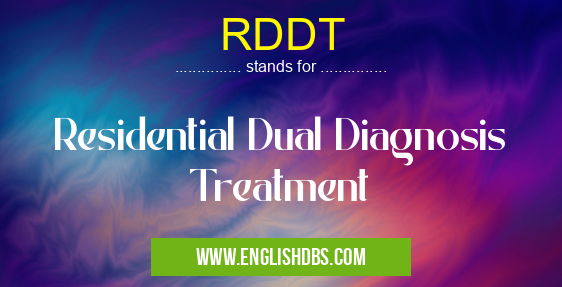What does RDDT mean in RESIDENTIAL
Residential Dual Diagnosis Treatment (RDDT) is a type of treatment used to address both mental health and substance use issues at the same time. It involves providing 24-hour care in an inpatient setting, meaning that clients can receive comprehensive treatment from psychiatrists, therapists, nurses, and other professionals in a secure environment. RDDT is used to address complex conditions that cannot be addressed with traditional outpatient care. This type of treatment has proven to be beneficial for many people who may otherwise not have had access to appropriate treatment options.

RDDT meaning in Residential in Community
RDDT mostly used in an acronym Residential in Category Community that means Residential Dual Diagnosis Treatment
Shorthand: RDDT,
Full Form: Residential Dual Diagnosis Treatment
For more information of "Residential Dual Diagnosis Treatment", see the section below.
» Community » Residential
What is RDDT?
RDDT is a form of therapeutic intervention designed specifically for individuals struggling with co-occurring mental health and substance use disorders. This type of dual diagnosis treatment typically involves the integration of evidence-based psychotherapies and pharmacological interventions within a residential setting with around-the-clock support from medical staff such as nurses and psychiatrists. As part of this approach, clients are offered individualized treatment plans tailored to each patient's unique needs with the aim of helping them achieve long term remission or stability in their condition.
Clients also have access to 24/7 support from trained professionals who are able to respond quickly if any crises arise. Other services available during RDDT include recreational activities, nutrition education, case management and other therapeutic activities designed to help patients reach their goals.
Benefits
The main benefit of RDDT is its ability to treat both mental health conditions and substance use disorders simultaneously rather than treating one disorder at a time. Working with one provider helps ensure continuity of care which lessens the chance that any new symptom or problem will slip through the cracks during treatment. Additionally, by taking place in a residential setting, clients are able to remove themselves from any triggers or difficult situations they may be facing outside of the facility so they can focus solely on their recovery process without distractions or disruptions.
Overall, Residential Dual Diagnosis Treatment can significantly improve outcomes for individuals struggling with both mental health issues and addiction by providing an intensive program tailored specifically to their particular needs while offering 24/7 support throughout their stay.
Essential Questions and Answers on Residential Dual Diagnosis Treatment in "COMMUNITY»RESIDENTIAL"
What is Residential Dual Diagnosis Treatment?
Residential Dual Diagnosis Treatment is an intensive treatment program that provides 24/7 care for individuals who have a mental illness and addiction. The treatment focuses on providing the individual with the necessary tools to manage mental health and addictive behaviors, as well as providing support and guidance to address any challenges.
What can I expect from Residential Dual Diagnosis Treatment?
During Residential Dual Diagnosis Treatment, you can expect to receive integrated treatment which addresses both your mental illness and addiction. This will include individual counseling sessions as well as group therapy sessions that focus on psychosocial issues associated with both your mental illness and your addiction. You may also participate in educational classes, recreational activities, and 12 step meetings.
Who should consider Residential Dual Diagnosis Treatment?
Residential Dual Diagnosis Treatment is recommended for individuals who are struggling with both a mental illness and an addiction simultaneously. If you are experiencing symptoms of a mental illness such as depression or anxiety, in addition to substance abuse or other addictive behaviors, this type of treatment may be beneficial for you.
How long does Residential Dual Diagnosis Treatment typically last?
The length of time spent in residential dual diagnosis treatment varies from person to person depending on the severity of their condition and their ability to make progress in therapy. Generally speaking, however, residential dual diagnosis treatment typically lasts between 30 - 90 days.
What types of Mental Illnesses Does Residential Dual Diagnosis Treat?
Residental dual diagnosis programs treat a wide variety of mental illnesses including depression, anxiety disorders, bipolar disorder, schizophrenia and more. These programs also specialize in treating co-occurring addictions such as alcoholism or drug use disorder along with the primary mental health issue.
Are medications included during Residential Dual Diagnosis Treatment?
Yes, medication can be prescribed during residential dual diagnosis treatment if deemed necessary by the medical staff overseeing care at the facility. Medications can help manage the symptoms associated with certain mental health issues while also helping to reduce cravings related to substance abuse disorders like addiction or alcoholism.
What kind of aftercare support is available after dual diagnosis treatment?
Aftercare support following residential dual diagnosis treatment includes outpatient counseling specific to maintaining sobriety from drugs or alcohol while also managing any underlying psychological conditions such as depression or anxiety disorders. Additionally, many facilities offer alumni programs that provide ongoing support for those who have completed residential dual diagnosis treatment program.
Are there any restrictions during my stay in a dual diagnosis program?
Yes, most residential dual diagnosis programs require that participants adhere to certain rules throughout their stay including following visiting hour guidelines set out by the facility as well as adhering to curfew requirements during off hours.
Where can I find a quality Residential Dual Diagnosis Program?
QualityDualDiagnosisTreatmentPrograms.com provides an extensive list of top-rated rehabilitation centers across the country that offer high-quality residential dual diagnosis treatments. You can search through various facilities by city or state and compare various amenities offered by each center before making your decision.
